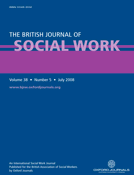-
Views
-
Cite
Cite
Matthew Colton, Susan Roberts, Margaret Williams, The Recruitment and Retention of Family Foster-Carers: An International and Cross-Cultural Analysis, The British Journal of Social Work, Volume 38, Issue 5, July 2008, Pages 865–884, https://doi.org/10.1093/bjsw/bcl375
Close - Share Icon Share
Abstract
Fostering services across the globe encounter difficulties in recruiting and retaining family foster-carers. Yet, we know little of the international and cross-cultural issues which impact on recruitment and retention. In this article, we draw on previous empirical research, and also on information collected during a recent study of global trends in family foster-care, to present an international comparative analysis of those issues. Three key themes emerged from the study: motivation and capacity to foster; professionalism versus altruism; and criteria for kinship and unrelated carers. Each of these presents a considerable challenge to foster-care services. Here, we explore these key themes further, and reflect on the implications for policy and practice.




